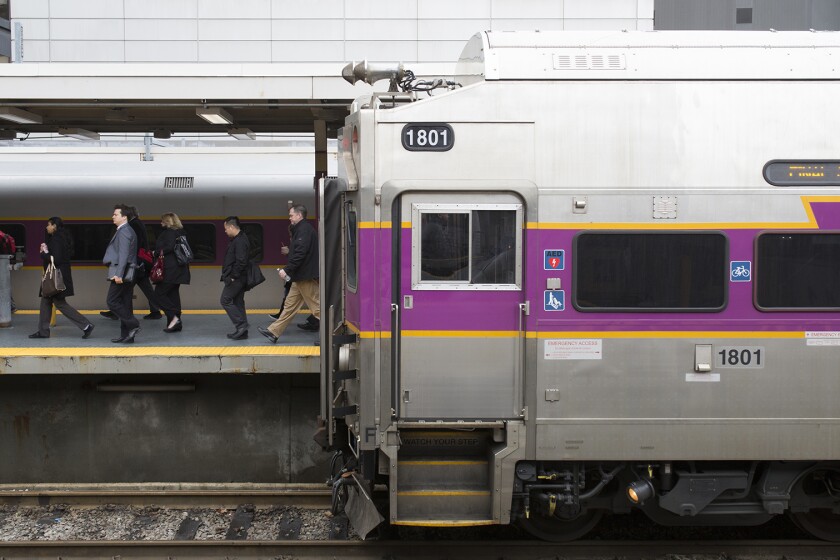In an attempt to speed commuters to work centers like Stamford and New York City, the state added six new trains on the New Haven Line starting Monday, along with seven new weekday trains on the Waterbury branch.
Those include three trains leaving New Haven during the morning rush at 5:09 a.m., 5:41 a.m., and 7:52 a.m., along with three express trains returning from New York City in the late afternoon and early evening.
Since the gubernatorial campaign of 2018, Lamont — a Greenwich resident since the 1980s — has spoken about the need to improve the railroad ride to Manhattan. The express trains will make the trip from Manhattan to New Haven in 1 hour and 39 minutes, which Lamont says would be the fastest time in a decade.
Besides hailing the improvements during an event in Bridgeport, Lamont traveled to Hartford to speak to a crowd of more than 300 top transportation officials at a major conference at the Marriott Hartford Downtown. He focused on the federal infrastructure bill that will be pouring $1.25 trillion into infrastructure nationwide, including more than $5 billion in Connecticut.
“There are very few times where you make a transformational difference,’' Lamont told the ballroom crowd, including state transportation commissioners from New York and Louisiana. “I think this is one of those unique times where, in transportation, we can make that difference. We had canals in the early 1800s. Then we had railroads throughout most of the 1800s. Then you had Model As and Model Ts and the beginning of roads. Then we had the highway system. Every generation or so, there is an opportunity to make a transformational difference. I think right here, right now, is our opportunity to make a transformational difference.’'
He added, “I can say for Connecticut ... this is long overdue.’'
Statewide, Connecticut will receive $5.38 billion over the next five years or approximately $1 billion per year. This includes $3.29 billion for major road projects, $1.3 billion for buses and railroads, $561 million to strengthen bridges, and $100 million for extending internet broadband coverage around the state and to low-income families.
The infrastructure money will help pay for repairing crumbling platforms at train stations across the state, along with creating charging stations for electric cars at 30 locations along the interstate highways, as well as city and rural roads. A major project includes improving the Gold Star Bridge on Interstate 95 in New London is important in order to handle large trucks that are currently too heavy to cross the aging bridge.
Separately, in the immediate term, the extra express trains are already here. While the state is using federal matching money for the trains in the category of congestion mitigation and air quality, the funding does not involve infrastructure money.
“Our rail is 15 to 20 minutes slower today than it was a generation ago,’' Lamont said. “Our highways are congested, and there are things we can do to make a difference. This is our opportunity to do so.’'
On the Waterbury branch, the weekday trains will increase to 22, up from the current 15 — representing an increase of 47 percent. That includes three new northbound trains and four southbound to help commuters in the Naugatuck Valley.
Metro-North president Catherine Rinaldi said the upgrades will deliver “the highest level of service on the Waterbury branch in history.’'
During remarks from the podium in Hartford, state transportation commissioner Joseph Giulietti surprised some when he said that the sometimes-criticized busway from New Britain to Hartford could be converted to light rail.
Giulietti told reporters later that it was simply a conceptual idea that he has, and the large DOT bureaucracy has not moved forward to make that happen.
“Do we actually have a study that has turned around and identified that as a [light rail] corridor? No,’' Giulietti said. “We’re years away from being able to do it. There’s not enough ridership there that I would push it. But do I envision it? Yes. ... It is conceptual, and I don’t want to press any alarms.’'
Republicans have blasted the busway for years as being overly expensive, and they battled against then-Gov. Dannel P. Malloy in both the House and Senate in an unsuccessful effort to block it.
Generally, putting in a light rail system in the past cost $50 million to $85 million per year, he said. But inflation recently has sharply boosted transportation costs.
“We’re all having to redo our numbers because between the supply chain and what has happened in terms of bids coming in and the cost of labor, things are going up,’' Giulietti said. “So I can’t give you a concrete number.’'
©2022 Hartford Courant. Distributed by Tribune Content Agency, LLC.









